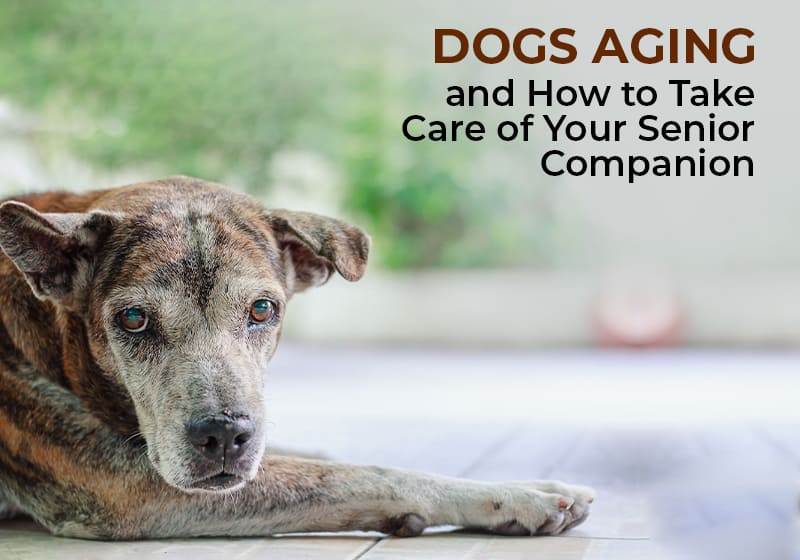Like humans, dogs also enjoy a senior age, and taking appropriate care of adult dogs can help them lead a healthy and quality life. Dogs need special care and attention in their mature years, and your love and support can boost energy into their inactive lives. So, to make things easier for you, we’ve created a blog that describes the dog aging process and how to best care for senior pets.

The aging process and its details
The effects of aging on a dog’s physical capabilities and health vary depending on the breed. In old age, a dog’s ability to hear, see, and move comfortably deteriorates, and appetite, skin condition, and energy levels degrade significantly. Dogs develop health conditions like joint stiffness, arthritis, and dementia, and in some cases, cancer and vital organ failures may appear in old age. Although dogs do not have a universal seniority age for all breeds, their body sizes decide the age. Large breed dogs live a short life as compared to small breed dogs. Numerous additional factors determine when a dog is regarded to be an adult, but experts advise that the last quarter of the breed’s anticipated life expectancy should be taken into consideration. When taken on an average, the following list explains the dog’s mature age:

Now, let’s understand how to care for your old furry buddy, and help them stay comfortable in their golden years.
How to care for your senior dogs
Although many dogs live a much longer life; their average life is around 12 years. Following are some suggestions that ensure your pet stays happy and healthy in their golden years.
Keep your adult dog at ease
Here are some points to consider while caring for your older dog:
- Old dogs may need more rest, so arrange a soft, cozy dog bed somewhere in a quiet corner away from disturbances, noise, and draughts.
- They use the toilet more frequently due to urinary incontinence and the bowl system, therefore make changes accordingly.
- At old age, lethargy may take over your dog, so keep things easily accessible. Such as water, food, toys, and bed should be kept within your dog’s easy reach.
- Give them something to grip because the slippery floors can be difficult for older dogs to walk on. You can put a rug or carpet on the floor for your dog to hold on while it walks around the house.
Feeding a senior dog
Dogs’ dietary needs alter as they age and depend on their breed and size. Additionally, gradually switching your dog’s diet to senior dog food by following your veterinarian’s advice will be ultimately beneficial for your pet.
- Consult your vet if you find any changes in your eating or drinking habits or weight. Your vet can analyze any underlying medical reasons and suggest the most suitable solution based on your dog’s health condition.
- If you have younger dogs in the house, feed them separately to maintain your senior dog diet.
Changing needs of older dogs
- It is recommended to provide frequent exercise and mental stimulation to seniors as aging slows them down.
- Keep your pet’s weight under control with short, frequent walks.
- Use toys and puzzle feeders to keep them entertained.
- Put on a coat while going out to keep them warm and dry.
- Provide tender grooming to your senior dog and spend quality time together. It can give you a chance to check for any lumps or bumps, aches, and pains your dog may be experiencing.
- Old age makes the dog less mobile due to stiffness of joints and muscles, and they have trouble getting out of bed and going upstairs. For this, talk to your vet for some treatments, vitamins, and supplements for joint care.
Older dog health and wellbeing
Senior dogs may have weak eyesight and poor hearing ability, so it is better to keep objects out of walkways and avoid loud noisy areas as this may cause trouble for your dog. These may even startle them and make them anxious and fearful to move about.
Do not neglect your dog’s dental health because healthy mouths can keep your dog’s overall health strong and prevent diseases in your dog. Keep an eye on your dog’s nails and trim them timely.
Wrapping Up
Your vet is the best to advise you on issues concerning your senior furry member. If you notice any changes in your dog’s habits or behavior, check with your vet because these may be signs of any underlying condition. Make sure to take your older dog for regular health checks to discard any health issues. And lastly, your love, care, and support will make the rest of your beloved friend’s life comfortable and happy.
